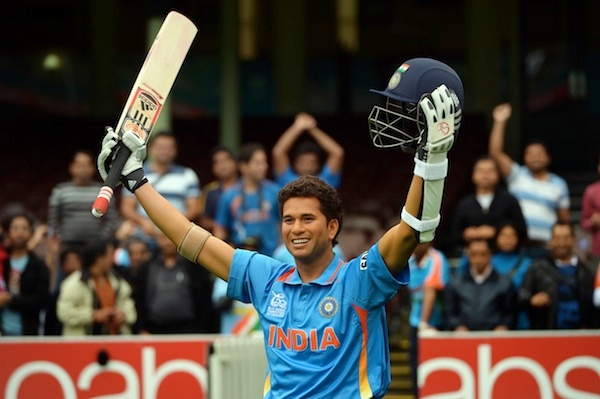Sachin Tendulkar did not have the happiest of 40th birthdays last week. The man who has been worshipped as a god in India for most of his career lasted only six balls, playing for Mumbai in the Indian Premier League, before being clean bowled by a young West Indian off-spinner who was only a year old when Tendulkar made his international debut. His dismissal silenced the huge crowd who had turned out for him in Calcutta, disappointed the TV executives who know that Tendulkar at the wicket means higher ratings, and left him plenty of time to eat some of the 40lb chocolate birthday cake presented to him before the match. His longevity is remarkable. Since making his India debut as a 16-year-old, Tendulkar has played almost 200 Test matches and 464 limited-overs internationals, setting records for international centuries (100) and runs (more than 34,000) that will never be beaten. And he is not finished. In all the birthday interviews, there was no hint of him wanting to walk away from the crease just yet. ‘Your job is to write, my job is to play,’ he told the press. ‘I will stick to my job and you stick to yours.’ Few cricketers thrive past the age of 40, the notable exception being Sir Jack Hobbs, who struck 100 of his 199 first-class centuries after entering his fifth decade. Like Tendulkar, who has had a bit of a fallow patch of late, the runs dried up for Hobbs as he approached 40 — but then started flowing freely once more. How lovely it would be to see the old Tendulkar once more, leaning forward to drive a ball elegantly down the ground or to punch a ball that is slightly short for four through the covers! Perhaps there will yet be an Indian summer for the Little Master. There is something delightful about watching old sportsmen still at the top of their game. It makes the rest of us feel younger. Australia have just recalled two 35-year-olds to their side for this summer’s Ashes, one of whom last played five years ago. They are in because they are the best. Sir Clive Woodward was asked in 2003 if he had any concerns about his England rugby squad being full of players the wrong side of 30. ‘The last time I checked, World Cups were not about development,’ he replied. Nor is the Ashes. The list of old sportsmen refusing to go gently into that good night goes on. There’s Ronnie O’Sullivan returning to the Crucible at 37 after not playing for a year and still stroking in sublime pots. Or Katherine Grainger, winning her first Olympic gold medal in rowing at the age of 36, never giving up on her dream after three silvers. There’s Angel Cabrera, almost winning the Masters at 43 and striking some of the most remarkable iron-shots and putts under pressure that you will see, all the time looking as if he would be even happier with a glass of Malbec and a fat Montecristo cigar. And Ryan Giggs, who signed his first professional contract with Manchester United the day after Margaret Thatcher left office, has just signed another extension that will take his stay at Old Trafford to the end of next season (at least) and into his forties. These ageing heroes remind us that sport is not just for those with flat stomachs and birth certificates from the 1990s, so long as you still have that competitive fire burning in your belly. You may have caught a blast the other day of Chris Gayle, the genial Caribbean über-mercenary, hammering the biggest, quickest score ever in a T20 match for the Bangalore Bollywood Basmati Booty-callers or some such. But fun though all the pyrotechnics were, would you rather watch that — or Monty Panesar having to bat for ten overs to save a Test match against some predatory Aussies or Kiwis? I know which I’d prefer.
 Roger Alton
Roger Alton
Spectator sport: Here’s hoping Sachin Tendulkar has an Indian summer after 40

issue 04 May 2013
Roger Alton is an executive editor at the Times.





Comments